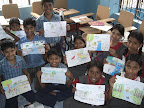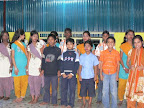Within The Dhaka Project I see so much promise - the project is really changing the community, and most importantly the kid's lives forever.
Being totally transparent we want to publish this here to let all our followers and supporters know what internal transformation is currently taking place.
(Email Below)
---------------------------------------
Dear all,
Whilst there is all of this talk of downsizing, I just want to provide a critique on the organisation and pass on my thoughts for the future.
I have now been here for 2 months and feel like I have witnessed enough to determine what is needed here for the long-term success of this organisation. I really would like you all to consider what I have said and provide feedback on the ideas.
Problems:
These can be broken down into the usual people, processes and communications.
People: At first you may think that these people are incompetent, but the longer you work with them the more you realise that they can do great work when they want to. The problem is just inspiring and coaching them to do it. This is also actually consistent with my other managing experiences here in Bangladesh as well as stories other foreigners tell. The staff here at TDP also really scared of leadership, and are therefore reactive rather than proactive – which leads to nothing getting done and no proactive behaviour to solve the issues before them. Also a part of being Bangladeshi is that they are afraid of failure, it is better to do nothing than to try something and potentially fail.
Staff also struggle to look into the future (development experts say that people in developing countries struggle to see past their next meal) and they also struggle to look at things from other people's perspective.
Processes: Fast initial growth was aided by our unstructured processes and our "let's just do it attitude", unfortunately this lack of structure which is now the causing complications for the size of the organisation. My experience and observation is that the team have always been reliant on the organisation head for the leadership; that person is the centre point of contact, the holder of all information and the person that has got the team moving. There is no information sharing within the team, information has always passed and held by the head. There is no leadership within the team, which has always come from the head and only the head. This is of no fault of the heads, this problem is really really common in NGOs like TDP throughout the world, it has always comes down to the head to drive the organisation from day 1. Without the driver the organisation looks lost.
Also, now the organisation is over 100 people, the head cannot manage to manage all staff- and unfortunately there is neither the structure nor the processes in place to ensure that all of the staff will get their job done without the head of the organisation yelling at them. (I used the term 'head' not to refer to Maria, as in Maria's absence the team still fall into these problems with her replacement and it is not a fault of hers)
Communications: One of the biggest hindrances, as I mentioned before – the head is used to be the centre point of all information (which initially is not a problem as that is what happens when a young company grows). But now this is just not physically possible for one person to be privy to all information whilst also trying to manage all staff and direction of the organisation. Communication channels need to be opened at a horizontal level (staff talking to staff, staff talking to teachers) without the need to go vertical (manager and staff communications). Communication channels also need to be opened up between external stakeholders and the organisation – children and org, parents and org, donors and org (remember communications is a 2 way process too).
Staff also believe in not communicating if it means that they might have to do more work or they could get in trouble – even if that non communication might lead to more problems later.
Solutions:
People: We need to find their motivations. One thing that has found them to be motivated by is money, and deducting from their salaries is a way to get them to act. Whilst this is effective, it is also a negative management method, it leaves staff even more afraid of being seen to try things and possibly fail as they will think that they could lose money. I propose that we set half of their salaries as a base salary, and then detail with each staff what they and the organisation has to do to get a 100% bonus (like a structure bonus that is commonly used in corporate world) and each month or quarter conduct a review of their performance as to whether they have carried out their responsibilities and get their structured bonus. You can also set organisation goals within the bonus structure (10% of the org performance will be on their pay) so if the org doesn't achieve its goals for that quarter, staff will only get 90% of total pay.
The team also need some career planning – i.e. ask them what their dreams are and help to show them how to get there. And then help them get there.
Processes: This is one of the hardest problems to answer as you don't want to bring overheads into the organisation's processes as a the ad-hoc process have been a great positive for ensuring that things just get done here without the great deal of approvals needed – and this is one thing that shouldn't change. But the one thing that is needed is to bring a structure to getting things done quickly. We have already covered this by giving people more defined roles and responsibilities… I believe a rule like "do things with your heart" will help them when they require direction and as long as you do it with your heart and show that you have thought it through with your head there should not be a problem.
One thing that would make this "heart" process better would be a well publicised mission and values statement for the organisation.
Lastly, with the defined roles and responsibilities, it is important that we evaluate each team member and how well they have met their responsibilities; this forms a learning and feedback session important for the individual and also the team.
The final ingredient for good processes is to trust the processes and the people owning them once they are in place!
Communications: We have a desperate need for people to talk in this organisation – kids have problems, and if the teacher doesn't know what to do or who to pass the information to the kid goes uncared for. Staff need other staff to do things for them, Families come to the counsellor, things do not make it to the team, parents have issues with staff – things just build up until parents want to start throwing rocks at us! What is needed are communication channels to manage information flows within the team. I have set up daily 15 minute meetings and weekly 1hour meetings. They are starting to get my team moving. There is also the use of email for communication and also the encouragement of horizontal information flows – All of these saving previously wasted times. The most important thing to create here is 2-way communication (not just top down communication) – let subordinates question a manager's decision (in appropriate way), allow for clarifications, allow for questions, allow for feedback. These are things that you wont see overnight, however create the right environment for the staff to feel comfortable doing this they will start within 6 months.
Thoughts for the Future:
Yes, we are correct to look at ensuring that we have the right team to go forward in this organisation. But we still must look to the sky and dream – know where our eventual goal is. When I do strategy consulting back in Australia, we set that distant goal for our clients and then work back from that goal to where they are today – defining what they need to achieve for each step back. Much like we do here with our kids in making them dream.
Whilst consolidation is an important first step for us to take, we should still set large goals as to where we want to be in the future (like ask the kid what is their dream) and communicate these goals (like the hand prints we have put on the wall).
All I was trying to do before was open dialogue in people sharing those large goals to us here in Dhaka. I am not going to apologise neither for being proactive… nor for dreaming for the kids of Bangladesh…
I believe I am preparing a team to not only go to the World Cup, but win the world cup.
I want to hear everyone's thoughts on what I have written here – we are all major stakeholders within these children's future.
Kind Regards,
Richard Fleming

Dear all,
Whilst there is all of this talk of downsizing, I just want to provide a critique on the organisation and pass on my thoughts for the future.
I have now been here for 2 months and feel like I have witnessed enough to determine what is needed here for the long-term success of this organisation. I really would like you all to consider what I have said and provide feedback on the ideas.
Problems:
These can be broken down into the usual people, processes and communications.
People: At first you may think that these people are incompetent, but the longer you work with them the more you realise that they can do great work when they want to. The problem is just inspiring and coaching them to do it. This is also actually consistent with my other managing experiences here in Bangladesh as well as stories other foreigners tell. The staff here at TDP also really scared of leadership, and are therefore reactive rather than proactive – which leads to nothing getting done and no proactive behaviour to solve the issues before them. Also a part of being Bangladeshi is that they are afraid of failure, it is better to do nothing than to try something and potentially fail.
Staff also struggle to look into the future (development experts say that people in developing countries struggle to see past their next meal) and they also struggle to look at things from other people's perspective.
Processes: Fast initial growth was aided by our unstructured processes and our "let's just do it attitude", unfortunately this lack of structure which is now the causing complications for the size of the organisation. My experience and observation is that the team have always been reliant on the organisation head for the leadership; that person is the centre point of contact, the holder of all information and the person that has got the team moving. There is no information sharing within the team, information has always passed and held by the head. There is no leadership within the team, which has always come from the head and only the head. This is of no fault of the heads, this problem is really really common in NGOs like TDP throughout the world, it has always comes down to the head to drive the organisation from day 1. Without the driver the organisation looks lost.
Also, now the organisation is over 100 people, the head cannot manage to manage all staff- and unfortunately there is neither the structure nor the processes in place to ensure that all of the staff will get their job done without the head of the organisation yelling at them. (I used the term 'head' not to refer to Maria, as in Maria's absence the team still fall into these problems with her replacement and it is not a fault of hers)
Communications: One of the biggest hindrances, as I mentioned before – the head is used to be the centre point of all information (which initially is not a problem as that is what happens when a young company grows). But now this is just not physically possible for one person to be privy to all information whilst also trying to manage all staff and direction of the organisation. Communication channels need to be opened at a horizontal level (staff talking to staff, staff talking to teachers) without the need to go vertical (manager and staff communications). Communication channels also need to be opened up between external stakeholders and the organisation – children and org, parents and org, donors and org (remember communications is a 2 way process too).
Staff also believe in not communicating if it means that they might have to do more work or they could get in trouble – even if that non communication might lead to more problems later.
Solutions:
People: We need to find their motivations. One thing that has found them to be motivated by is money, and deducting from their salaries is a way to get them to act. Whilst this is effective, it is also a negative management method, it leaves staff even more afraid of being seen to try things and possibly fail as they will think that they could lose money. I propose that we set half of their salaries as a base salary, and then detail with each staff what they and the organisation has to do to get a 100% bonus (like a structure bonus that is commonly used in corporate world) and each month or quarter conduct a review of their performance as to whether they have carried out their responsibilities and get their structured bonus. You can also set organisation goals within the bonus structure (10% of the org performance will be on their pay) so if the org doesn't achieve its goals for that quarter, staff will only get 90% of total pay.
The team also need some career planning – i.e. ask them what their dreams are and help to show them how to get there. And then help them get there.
Processes: This is one of the hardest problems to answer as you don't want to bring overheads into the organisation's processes as a the ad-hoc process have been a great positive for ensuring that things just get done here without the great deal of approvals needed – and this is one thing that shouldn't change. But the one thing that is needed is to bring a structure to getting things done quickly. We have already covered this by giving people more defined roles and responsibilities… I believe a rule like "do things with your heart" will help them when they require direction and as long as you do it with your heart and show that you have thought it through with your head there should not be a problem.
One thing that would make this "heart" process better would be a well publicised mission and values statement for the organisation.
Lastly, with the defined roles and responsibilities, it is important that we evaluate each team member and how well they have met their responsibilities; this forms a learning and feedback session important for the individual and also the team.
The final ingredient for good processes is to trust the processes and the people owning them once they are in place!
Communications: We have a desperate need for people to talk in this organisation – kids have problems, and if the teacher doesn't know what to do or who to pass the information to the kid goes uncared for. Staff need other staff to do things for them, Families come to the counsellor, things do not make it to the team, parents have issues with staff – things just build up until parents want to start throwing rocks at us! What is needed are communication channels to manage information flows within the team. I have set up daily 15 minute meetings and weekly 1hour meetings. They are starting to get my team moving. There is also the use of email for communication and also the encouragement of horizontal information flows – All of these saving previously wasted times. The most important thing to create here is 2-way communication (not just top down communication) – let subordinates question a manager's decision (in appropriate way), allow for clarifications, allow for questions, allow for feedback. These are things that you wont see overnight, however create the right environment for the staff to feel comfortable doing this they will start within 6 months.
Thoughts for the Future:
Yes, we are correct to look at ensuring that we have the right team to go forward in this organisation. But we still must look to the sky and dream – know where our eventual goal is. When I do strategy consulting back in Australia, we set that distant goal for our clients and then work back from that goal to where they are today – defining what they need to achieve for each step back. Much like we do here with our kids in making them dream.
Whilst consolidation is an important first step for us to take, we should still set large goals as to where we want to be in the future (like ask the kid what is their dream) and communicate these goals (like the hand prints we have put on the wall).
All I was trying to do before was open dialogue in people sharing those large goals to us here in Dhaka. I am not going to apologise neither for being proactive… nor for dreaming for the kids of Bangladesh…
I believe I am preparing a team to not only go to the World Cup, but win the world cup.
I want to hear everyone's thoughts on what I have written here – we are all major stakeholders within these children's future.
Kind Regards,
Richard Fleming







No comments:
Post a Comment